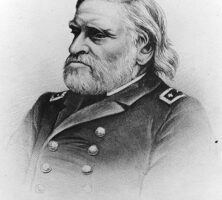Josiah Tattnall was a long-serving American naval officer and a noteworthy figure during the Civil War (1861-65). He was born at Bonaventure Plantation, near Savannah, on November 9, 1795, to Harriet Fenwick and Josiah Tattnall, a Georgia senator and governor.
Orphaned in 1803, Tattnall was sent to live with his paternal grandfather in England for schooling. He returned to Savannah in 1811 and entered the U.S. Navy as a midshipman in 1812. In August 1814, during the War of 1812 (1812-15), Tattnall fought against the British with land-based naval forces at the Battle of Bladensburg, in Maryland. He married Harriette Fenwick Jackson, his first cousin, circa 1821. They had several daughters and one son.

In 1846 a seventy-acre tract of the Tattnall plantation was sold to Peter Wiltberger, a Savannah businessman, for a cemetery. The enlarged burial site was purchased by Savannah in 1907 and continues today as Bonaventure Cemetery.
Tattnall remained in the navy and saw varied service around the world. He fought against Algerian pirates under Commodore Stephen Decatur, and he was wounded in action during the Mexican War (1846-48). Following duty on the Great Lakes, he became flag officer (before the grade of admiral was authorized) and commander of the East India Squadron at Hong Kong in 1858. In violation of U.S. neutrality Tattnall assisted British warships attacking Chinese forts in 1859. He defended his action by quoting the proverb “blood is thicker than water.” He conveyed the first Japanese embassy to the United States to San Francisco, California, in 1860.
After Georgia seceded from the Union on the eve of the Civil War, Tattnall, despite his personal aversion to secession, resigned from the U.S. Navy on February 20, 1861. He was subsequently commissioned as a captain of the Confederate navy, with responsibility for the coasts of Georgia and South Carolina. He conducted unsuccessful actions against U.S. forces at Port Royal, South Carolina, in 1861.
During the battle between the Monitor and the Merrimac (CSS Virginia) at Hampton Roads, Virginia, on March 9, 1862, Franklin Buchanan, the Confederate commander of Virginia, was wounded. Tattnall was named to replace him. Months later, in May, Southern forces attempted to retreat from the Norfolk, Virginia, area, knowing that Union forces would soon arrive. Fearing that the ironclad would be captured by Union troops, Tattnall ordered it to be destroyed. Subsequently a board of inquiry censured Tattnall, ruling that blowing up the ship had been unnecessary. He was later exonerated by a court martial. Tattnall returned to his command at Savannah and was there overseeing the destruction of the remaining Confederate vessels, including the ironclad CSS Savannah, when the city fell to the Union forces of General William T. Sherman in December 1864. Following a retreat to Augusta, Tattnall was captured there as a prisoner of war and was paroled in May 1865.
Tattnall moved to Nova Scotia, Canada, in 1866. He lived there for four years before returning penniless to Savannah, where the city created the position of inspector of the port in order to provide him an income. He died on June 14, 1871, and was buried at Bonaventure Cemetery.






